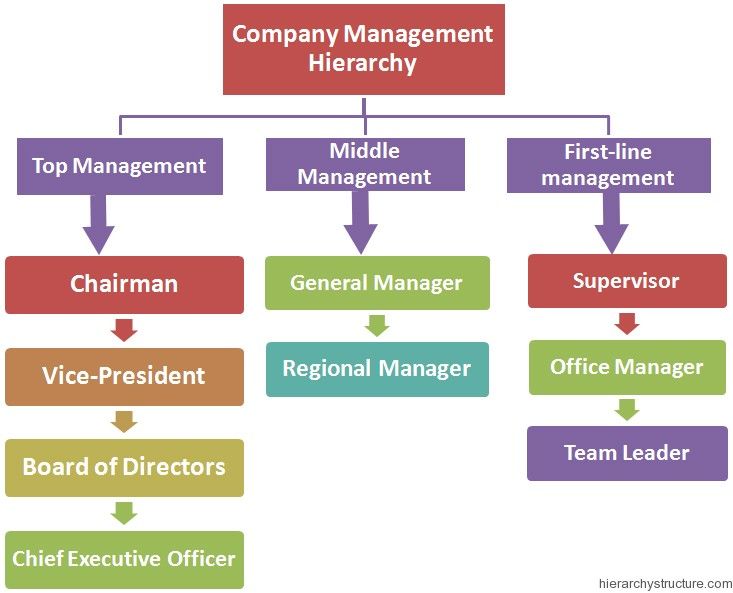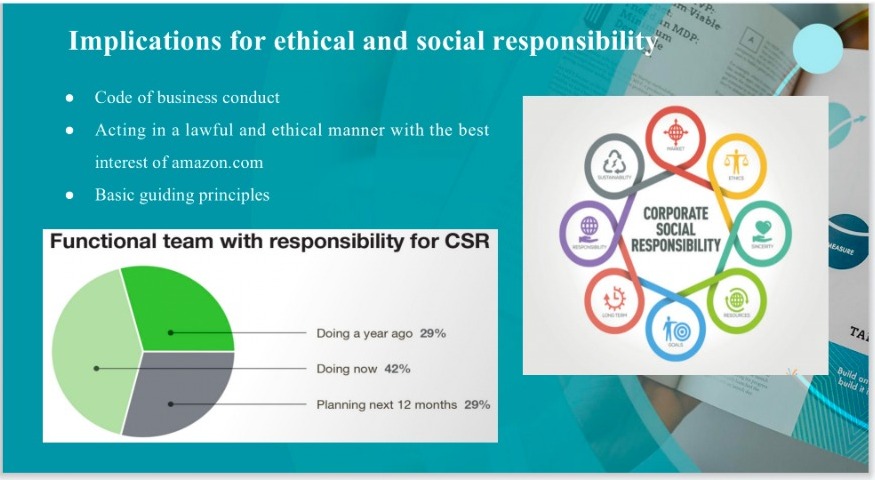BA70035E: Management Skills for Executives

Introduction(BA70035E: Management Skills for Executives)
Strategic management helps an organisation to develop policies and plans in such a way that enhances chances of accomplishing organisational goals effectively. On the other hand, strategic management also allows an organisation to allocate organisational resources strategically that brings competitive advantages across the target market. Thus, the following section will highlight the effectiveness of strategic management by considering the case of global and leading business company Amazon. Implication for social responsibility and ethical practices along with recommendations to navigate the present business environment will also be highlighted in the context of Amazon.
Implications for strategic management
Strategic management is considered a systematic approach or future-oriented approach for an organisation that serves as beneficial to strengthen overall organisational performance and growth. As mentioned by Ivanova et al. (2019), an organisation that has a strong strategic management approach can maximise their chance towards generating long-term market prosperity and growth systematically. On the other hand, it is identified that strategic management helps to formulate a suitable business mission that helps to drive business growth and profit margin within the target market.
Based on the findings above in the case of Amazon in relation to the strategic management approach can be interlinked. The key reason behind this statement is that the strategic management of Amazon is found to be a “commitment towards customer experience” (Amazon, 2021). In addition to this, the company introduces a customer-centric approach along with a convenient approach in its business operations that helps them to keep their competitiveness across the global market. Maximisation of customer experiences can be considered as one of the strategic management approaches for Amazon that serves as effective to enhance their productivity level and profitability rate significantly.
In addition to that considering the above-mentioned aspects, business innovation through the adoption of modern technologies can be considered as another strategic management approach for the aforementioned company. The key reason behind this statement is that through business innovation that implemented e-commerce platforms that help to enhance their responsiveness towards customer query and retain customer base for a longer time (Baldwin, 2020). For example, Amazon has provided options for Prime Membership that helps them to retain customers for a longer time and at the same time, their target customers could avail additional discounts or benefits upon their purchase.
Innovative logistic systems can be considered as another strategic management of Amazon that fosters their growth and profitability rate within the domestic as well as global market. For example, launching Amazon Prime Air, Parachute deliveries, robotics implementation Amazon’s warehouse and others, the company continues to expand its business innovation to sustain its business competitiveness (Banker, 2021). Technological innovation can be considered as one of the strategic ways for Amazon in terms of introducing business agility and strategic pricing that helps in fostering its growth across the global market effectively.
Implications for ethical and social responsibility
Decent ethical responsibility has been implicated within the operational context of Amazon. In terms of defining the ethical values of Amazon, different code of business conduct can be notified. This code of conduct is responsible for the commitment from Amazon employee’s perspective in terms of acting in a lawful and ethical manner with the best interest of amazon.com (Amazon, 2021). Moreover, basic guiding principles are also enlightened within this code of business conduct.
These principles include conflict of interest in terms of performing regular job responsibilities, avoidance of discrimination and workplace harassment, employee health and safety welfare, avoidance of bribery and payments to the government personnel, reporting of violations in the workplace and others. In this context, fair maintenance of financial records and reports are also included, which defines greater emphasis of Amazon towards the ethical implications in their business. Similarly, Amazon management is also responsible for providing a safe and healthy workplace for their employees free of harassment and danger (Amazon, 2021).
The ethical implications from the managerial perspective of Amazon also reflect the freedom of employees in terms of successfully performing their duties on behalf of Amazon.
Extensive social responsibility has been implicated by Amazon, which can be enlightened through different community welfare programs undertaken by the organisation in different countries and markets. For example, the context of community outreach programs can be considered from Amazon’s perspective. Amazon has invested $100 million in order to set up an emerging homeless shelter inside their downtown Seattle campus in order to help simplify the strain of chronic homelessness (Dean, 2021).
Moreover, a new groundwork was also laid by Amazon for their emerging housing equity fund for promoting more affordable housing during 2020. Along with this, Amazon allocated $50 million for promoting stem education during 2020.
This investment also includes the proportion of Amazon future engineer program outline for helping the students and young adults from underserved and underrepresented communities. In order to cope up with the ongoing covid-19 pandemic situation, Amazon also initiated to invest around $4 billion for the covid-19 related initiatives (Dean, 2021).
With this investment, over 1 million in-house covid-19 tests were administered throughout the US to prevent the spread of coronavirus. Moreover, a $25 million relief fund was also set up by Amazon for supporting seasonal workers and independent delivery service partners financially affected by the pandemic (Dean, 2021).
Recommendation for navigating the current business environment
- Utilization of AI and ML
- Increased efficiency of the systems
- Improvements in services
- Improvements in resources management
The use of artificial intelligence and machine learning can effectively increase the capability of the organisation to carry out its operations in a more effective manner. This can help in improving the existing services and improve the resource management capabilities of Amazon. Adding to that, with the help of artificial intelligence and machine learning Amazon would also be able to study the changes occurring in the market and modify their services accordingly (Wickham, 2018). This would also add to the competitiveness of the company in the global e-commerce industry.
- Improving line of communication
- Increase in productivity
- Mitigation of issues arising due to miscommunication
- Increase in consumer satisfaction levels
Communication is an important part of organisational Management and improving the line of communication can, not only help the company to improve its internal operations but would also help in managing the external stakeholders.
This can effectively help in increasing the productivity and mitigation of issues that arise generally due to miscommunication. Furthermore, the consumer satisfaction levels would also increase with the improvements in communication (Al-Ajlouni et al. 2019).
- Improving monitoring capabilities
- Improvements in the company’s operations
- Improvements in problem and risk management
- Reduction in the operational failures
Monitoring the organisation is necessary to identify any kind of issues or problems and in this regard improving the monitoring capabilities can help in achieving better results. The operations of the company would drastically improve apart from that risk management and problem-solving capabilities would improve. Furthermore, the operational failures that occur due to the lack of monitoring capabilities of a company can also be mitigated (De Sisto et al. 2019).
- Forming balanced teams
- Increased team efficiency
- Higher productivity of teams
- Improvements in workflow
The human resources of the company are the most valuable resource an organisation can have and, in this regard, forming a balanced team can help in achieving the goals and objectives of the company in a more systematic manner. Forming balance teams can help in increasing the overall efficiency of the workforce, which would lead to higher productivity.
Therefore, the chances of losses occurring due to inefficient teams can be mitigated and a higher level of productivity and revenue can be generated (Manzoor et al. 2019). The workflow between the different teams who are engaged in achieving a particular objective would also improve with the help of balanced teams working under the company.
- Improving training and management of human resources
- Overall skill improvements
- A better and more capable workforce
- Increased overall efficiency
Training the human resources of the company can effectively improve the overall efficiency of the workforce. Moreover, training would also help the workforce to adapt to new technology that the company wishes to implement. Additionally, training also creates a constant learning and development environment (Ahammad, 2017). Furthermore, training and development can also allow help the organisation to improve their ability to swiftly act according to the needs of the targeted customers within the global market.
Conclusion
The overall report has signified the strategic management prospects along with ethical and social responsibility from the operational perspective of Amazon. In this concern, different commitment has been provided by Amazon to empower customer experience under the shape of customer-centric service facilities.
The implementation of modern technologies is also helping Amazon to consider business innovation. Similar consequences can be reflected with the innovative logistics system and strategic pricing attributes which are adding a greater value to the strategic management of Amazon.
Different ethical behaviour has been insured by Amazon management with regards to considering ethical responsibility from both the managerial and employee perspective with code of business conduct and basic guiding principles. The aspects of community outreach programs and other social welfare programs define greater emphasis of Amazon management towards community welfare.
References
Ahammad, T., 2017. Personnel management to human resource management (HRM): How HRM functions. Journal of Modern Accounting and Auditing, 13(9), pp.412-420.
Al-Ajlouni, M.I., Nawafleh, S. and Alsari, H., 2019. The moderating effect of electronic-HRM on training and employee performance relationship: a moderated model. International Journal of Management Practice, 12(4), pp.511-532.
Amazon, 2021. About Amazon. [Online] Available at: <https://www.aboutamazon.com/> [Accessed on 29 May 2021]
Amazon, 2021. Code of Business Conduct and Ethics. [Online]. Available at: <https://ir.aboutamazon.com/corporate-governance/documents-and-charters/code-of-business-conduct-and-ethics/default.aspx> [Accessed 29 May 2021]
Baldwin, G., 2020. The Strategies Behind Amazon’s Success. [Online]. Available at: <https://www.omniaretail.com/blog/the-strategies-behind-amazons-success> [Accessed on 29 May 2021]
Banker, S., 2021. Amazon Supply Chain Innovation Continues. [Online] Available at: <https://www.forbes.com/sites/stevebanker/2021/04/01/amazon-supply-chain-innovation-continues/?sh=1297c85377e6> [Accessed on 29 May 2021]
De Sisto, M., Cavanagh, J., McMurray, A. and Bartram, T., 2019. Emergency management and HRM in local governments: HR professionals as network managers. Asia Pacific Journal of Human Resources, 57(2), pp.227-246.
Dean, M., 2021. Amazon Corporate Social Responsibility (CSR) and Sustainability. [Online]. Available at: <https://www.thomasnet.com/articles/other/amazon-csr-sustainability/> [Accessed 29 May 2021]
Ivanova, A.S., Holionko, N.G., Tverdushka, T.B., Olejarz, T. and Yakymchuk, A.Y., 2019. The Strategic Management in Terms of an Enterprise’s Technological Development. Journal of Competitiveness, 11(4), p.40.
Manzoor, F., Wei, L., Bányai, T., Nurunnabi, M. and Subhan, Q.A., 2019. An examination of sustainable HRM practices on job performance: An application of training as a moderator. Sustainability, 11(8), p.2263.
Wickham, M., 2018. Practical Java Machine Learning: Projects with Google Cloud Platform and Amazon Web Services. Apress.


